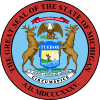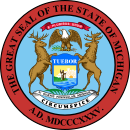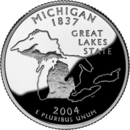The Michigan Portal  Michigan (/ˈmɪʃɪɡən/ MISH-ig-ən) is a state in the Great Lakes region of the Upper Midwest region of the United States. It borders Wisconsin to the southwest in the Upper Peninsula, and Indiana and Ohio to the south in the Lower Peninsula; it is also connected by Lakes Superior, Michigan, Huron, and Erie to Minnesota and Illinois, and the Canadian province of Ontario. With a population of nearly 10.12 million and an area of 96,716 sq mi (250,490 km2), Michigan is the 10th-largest state by population, the 11th-largest by area, and the largest by area east of the Mississippi River. Its capital is Lansing, and its largest city is Detroit. Metro Detroit is among the nation's most populous and largest metropolitan economies. The name derives from a gallicized variant of the original Ojibwe word ᒥᓯᑲᒥ (mishigami), meaning "large water" or "large lake". Michigan consists of two peninsulas. The Lower Peninsula resembles the shape of a mitten, and comprises a majority of the state's land area. The Upper Peninsula (often called "the U.P.") is separated from the Lower Peninsula by the Straits of Mackinac, a five-mile (8 km) channel that joins Lake Huron to Lake Michigan. The Mackinac Bridge connects the peninsulas. Michigan has the longest freshwater coastline of any political subdivision in the United States, being bordered by four of the five Great Lakes and Lake St. Clair. It also has 64,980 inland lakes and ponds. Michigan has the second-most water area of any state, behind only Alaska. The area was first occupied by a succession of Native American tribes over thousands of years. In the 17th century, French explorers claimed it as part of the New France colony, when it was largely inhabited by Indigenous peoples. French and Canadian traders and settlers, Métis, and others migrated to the area, settling largely along the waterways. After France's defeat in the French and Indian War in 1762, the region came under British rule. Britain ceded the territory to the newly independent United States after its defeat in the American Revolutionary War. The area was part of the larger Northwest Territory until 1800, when western Michigan became part of the Indiana Territory. Michigan Territory was formed in 1805, but some of the northern border with Canada was not agreed upon until after the War of 1812. Michigan was admitted into the Union in 1837 as the 26th state, a free one. It soon became an important center of industry and trade in the Great Lakes region, attracting immigrants in the late 19th and early 20th centuries from many European countries. Immigrants from Finland, Macedonia, and the Netherlands were especially numerous. Migration from Appalachia and of Black Southerners as part of the Great Migration increased in the 1930s, with many settling in Metro Detroit. Although Michigan has developed a diverse economy, in the early 20th century it became widely known as the center of the U.S. automotive industry, which developed as a major national economic force. It is home to the country's three major automobile companies (whose headquarters are all in Metro Detroit). Once exploited for logging and mining, today the sparsely populated Upper Peninsula is important for tourism because of its abundance of natural resources. The Lower Peninsula is a center of manufacturing, forestry, agriculture, services, and high-tech industry. (Full article...) Entries here consist of Good and Featured articles, which meet a core set of high editorial standards.
The White Stripes were an American rock duo formed in Detroit, Michigan, in 1997. The group consisted of Jack White (guitar, keyboards, piano, vocals) and Meg White (drums, percussion, vocals). They were a leading group of the 2000s indie rock and garage rock revival. Beginning in the late 1990s, the White Stripes sought success within the Detroit music scene, releasing six singles and two albums. They found commercial success with their third album, White Blood Cells (2001), which received critical acclaim and propelled them to the forefront of the garage rock revival. Their fourth album, Elephant (2003), drew further success and gave the band their first Grammy Awards. The band heavily experimented on their fifth album, Get Behind Me Satan (2005), which polarized critics. They returned to their blues roots with their sixth and final album, Icky Thump (2007), which evoked similar praise to that of the band's earlier albums. After a lengthy hiatus from performing and recording, the band dissolved in 2011. (Full article...) Selected picture - Sylvania Wilderness is an 18,327-acre (74 km2) area of land located a few miles west of Watersmeet, Michigan. The area is located entirely within the bounds of the Ottawa National Forest, and is currently being managed as a wilderness area as part of the National Wilderness Preservation System by the U.S. Forest Service. Did you know -
Related portalsSelected article - The Michigan State Spartans are the athletic teams that represent Michigan State University. The school's athletic program includes 23 varsity sports teams. Their mascot is a Spartan warrior named Sparty, and the school colors are green and white. The university participates in the NCAA's Division I and the Football Bowl Subdivision for football. The Spartans participate as members of the Big Ten Conference in all varsity sports. Michigan State offers 11 varsity sports for men and 12 for women. MSU's football team was consensus national champion in 1952, the (UPI) Coaches' national champion in 1965, and named national champion by different ratings groups in 1951, 1955, 1957, and 1966. They have also won the Rose Bowl in 1954, 1956, 1988 and 2014. Its men's basketball team won the NCAA National Championship in 1979 and 2000. The MSU men's ice hockey team won national titles in 1966, 1986 and 2007. (Full article...) Selected biography -Kristen Anne Bell (born July 18, 1980) is an American actress. She began her acting career starring in stage productions, while attending the Tisch School of the Arts at New York University. She made her Broadway stage debut as Becky Thatcher in the comedy musical The Adventures of Tom Sawyer and appeared in a Broadway revival of The Crucible the following year. She later appeared in the action thriller film Spartan (2004) and received praise for her performance in the television drama film Gracie's Choice (2004). Bell received a Saturn Award for Best Actress on Television for her performance as the title character in the television series Veronica Mars (2004–2007). She reprised the eponymous role in the 2014 film and the 2019 revival. During her time on Veronica Mars, she starred as Mary Lane in the musical film Reefer Madness: The Movie Musical (2005), a role she would later reprise in the New York musical of the same name. (Full article...) General imagesThe following are images from various Michigan-related articles on Wikipedia.
TopicsCategoriesSymbols
Lists
Related pagesWikimediaThe following Wikimedia Foundation sister projects provide more on this subject:
Things you can doDiscover Wikipedia using portals | ||||||||||||||||||||||||||||||||||||












































































